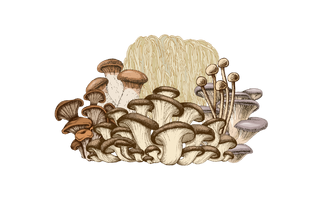The Amazing Benefits of Mushrooms
(4 Minute Read)
Nutrition, in general, is not discussed often enough, and nutritionally dense foods are discussed even less. It's essential to recognize that everything we consume becomes a part of us, shaping who we are. So why not embrace the very best that Mother Earth has to offer? Why not strive for our highest potential to experience optimal health? After all, we are what we eat, aren't we?
However, I understand—you're busy, and it takes time! That's why today's focus is on mushrooms, a single food source packed with remarkable nutritional benefits.
Mushrooms contain a variety of compounds that have anti-inflammatory properties, including:
- Polysaccharides: These are long chains of sugar molecules that have been shown to reduce inflammation by stimulating the immune system and suppressing the production of inflammatory molecules.
- Phenolic compounds: These compounds have antioxidant properties and can help to protect cells from damage caused by free radicals. Free radicals are unstable molecules that can contribute to inflammation.
- Indol compounds: These compounds have been shown to inhibit the production of inflammatory molecules, such as cytokines.
- Mycosterols: These compounds have anti-inflammatory and antioxidant properties.
- Beta-glucans: These compounds have been shown to reduce inflammation by stimulating the immune system.
The anti-inflammatory effects of mushrooms have been shown in both animal and human studies. For example, one study found that eating mushrooms for 12 weeks reduced levels of inflammatory markers in people with rheumatoid arthritis.
Mushrooms can help digestion in a few ways:
- They are a good source of fiber. Fiber is an important nutrient for digestion because it helps to keep the digestive system healthy and regular. Mushrooms are a good source of soluble fiber, which is the type of fiber that dissolves in water and forms a gel-like substance in the digestive tract. This gel-like substance helps to slow down the movement of food through the digestive tract, which can help to prevent constipation.
- They contain prebiotics. Prebiotics are non-digestible food ingredients that promote the growth of beneficial bacteria in the gut. These beneficial bacteria help to keep the gut healthy and can also help to improve digestion. Mushrooms contain a type of prebiotic called beta-glucans.
- They have anti-inflammatory properties. Inflammation can contribute to digestive problems, such as irritable bowel syndrome (IBS). Mushrooms have anti-inflammatory properties that can help to reduce inflammation in the gut.
Mushrooms contain a variety of compounds that have been shown to have beneficial effects on cognitive function and anxiety, including:
- Beta-glucans: These compounds have been shown to improve cognitive function by increasing the production of new brain cells and synapses.
- Triterpenes: These compounds have been shown to have anti-inflammatory and antioxidant properties, which can help to protect the brain from damage.
- Hericenones and erinacines: These compounds have been shown to promote the growth of new nerve cells and synapses.
- Phenolic compounds: These compounds have antioxidant properties and can help to protect the brain from damage.
There are an abundance of reasons to start adding mushrooms to your diet today and if you're serious about taking back full control of your health, they are certainly a wonderful place to start.

